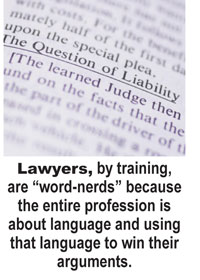The one thing that is constant is that change will occur on a regular basis. Hence, narrative formats and the needs of the courts change on a regular basis. A narrative is only as good as the admissibility the court grants it, and the courts rule everyday setting precedent. Therefore, regular changes are a necessity.
I have traveled the country over the last 21 years, lecturing to 10,000’s of lawyers on personal injury and, at the end of each presentation I give, I have the audience review a narrative template. This is my research palate and I have lectured as recently as three days ago with a dozen more lectures scheduled over the next few weeks in cities ranging from Portland, Oregon, to Orlando, Florida, to Springfield, Massachusetts. The point is that the information is current nationally.
 There are three issues that are paramount in narrative report writing. First is admissibility, and that is primarily based on your credentials. The second is the accuracy and consistency of your clinical information. Lastly is your ability to communicate in writing with proper grammar and format.
There are three issues that are paramount in narrative report writing. First is admissibility, and that is primarily based on your credentials. The second is the accuracy and consistency of your clinical information. Lastly is your ability to communicate in writing with proper grammar and format.
Let’s discuss the basics first: grammar and spelling. You had better know how to spell or use “spell check.” Doctors are considered experts and are held to a higher standard. If you want to be taken seriously, your report shouldn’t have any spelling or grammatical errors. I have critiqued 1000’s of chiropractors’ reports and over 70% have simple spelling errors and grammatical mistakes. That not only doesn’t bode well for your practice, but it makes us look like fools as a profession. That is not tolerable.
Lawyers, by training, are “word-nerds” because the entire profession is about language and using that language to win their arguments. One misspoken or mistyped word can give an experienced lawyer an opening to twist the meaning of your report and change what you intended to say. Say it clearly and accurately. If your weakness is grammar, hire someone to proof your reports prior to submitting them.
The next thing to be wary of are those “canned reports.” Many of you have software that generates reports. Most of them are horrible, as proven by what I have read from almost every one in every format in the nation. They can be the cause of the lawyer’s losing the case and not considering you as an expert. A classic example is the report that reads, “The patient’s first stated symptom…. The patient’s second stated symptom….” Who writes like that? The answer is a computer and not a real person. You would never see a neurosurgeon or an orthopedist using such poor grammar, as they are the standard of the courts, like it or not, and your competition. Histories should flow in proper sentence and paragraph format, not choppy statements. If the reports look “canned,” the courts will not allow them into testimony. A good defense lawyer WILL convince the courts they are not specific for your patient, true or not, as I have seen and been told all too often.
Another big issue is what you are giving testimony on. Remember, your narrative report is an admissible document and, therefore, is tantamount to testimony. If you include an opinion on magnetic resonance imaging (MRI) as an example, you must have credentials in interpreting MRI’s. In most states, you cannot make statements based on another doctor’s report unless that report has already been entered into testimony in a trial, as it will be considered hearsay. Although most cases never get to trial, a lawyer will not consider you for their client without the appropriate credentials. Lawyers consider a doctor for their clients as if they have to go to court. Why would they consider working with you if you cannot sustain their cases all the way to trial? In fact, many lawyers will take your patients without your knowing it and refer those patients to other “better credentialed” specialists, so they can win the cases. I have gotten 100’s of those types of referrals over the years and the treating doctors never had a clue!
Here’s an easy one, if you want to look the fool. Sign your name “Dr. John Smith, D.C.” That is improper grammar! You should either use the Dr. in front or the D.C. at the end, not both. I strongly recommend you always use the D.C., as there will never be a question of your credentials and your intent when they are communicated this way with the public.
When you are rendering your history, do you write, “The patient was rear-ended by a…?” Were you there? Did you witness the accident? You have to write, “The patient reported that….” In addition, many of you comment on the amount of damage or the condition of the road. Are you expert at auto repair or accident reconstruction? You have to stay within your specialty as an expert or your work will not be considered admissible.
This is the tip of the iceberg as far as admissibility and what lawyers nationally have been teaching me for too many years. The rule of thumb is to stay within your specialty and be sure to have the formal credentials so that your work can be admitted.
Dr. Mark Studin is a consultant and educator. He teaches how, through clinical excellence, to build PI practices and can be found at www.teachchiros.com. He is also the creator of the US Chiropractic Directory that hosts the world’s first CV builder for chiropractors and offers that for free to doctors of chiropractic and can be found at www.USchirodirectory.com.
